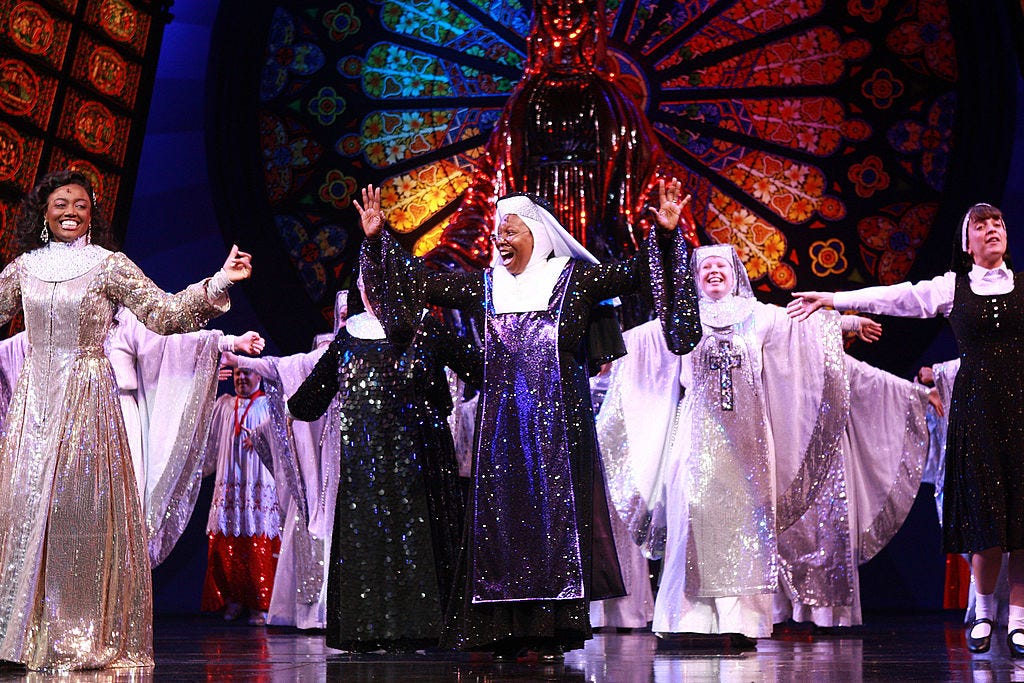Modern Life Is Ruining Storytelling
Things have to actually, you know, happen.

Over the last few months, for various reasons (teenage visitors, post-Christmas lull, being tired), I’ve had cause to watch a good few movies from the eighties, nineties and noughties, namely: Back to the Future, Sister Act, Mrs. Doubtfire, and Legally Blonde. They’re all bangers. They’re all crowd pleasers. The teenagers loved them.
You don’t get these sort of mid-budget, star-vehicle movies anymore; they were a product of their time that’s been sacrificed to the Marvelisation of Hollywood. It’s a shame. They were brilliant and fun—and because they were made for mass-audience consumption, they prioritized storytelling. In that way, they’re masterclasses in good narrative writing.
The first scenes in all of these films give us a sense of the main characters—and immediately set up their lack, an absence or problem that the rest of the film will revolve around or attempt to resolve. In Legally Blonde, it’s Elle Woods, an apparently airheaded girl who is expected, by everyone in her life, to do nothing more than marry well. In Mrs. Doubtfire, it’s underappreciated voice actor Daniel, who loses his job, his marriage, and his access to his kids, all within about ten minutes.
In Sister Act, meanwhile, we immediately meet Whoopi Goldberg’s character, Deloris Van Cartier, in the lackluster and largely ignored lounge act she performs in. She goes to quit, to tell her married mafia boyfriend that she’s done, and accidentally witnesses the murder of a mob snitch. BAM. The problems: she’s talented but unappreciated, she’s in a relationship where she’s always the side piece but she can’t get out, and now her life is in danger as well.
As a writer, what you notice about Sister Act is that every single scene advances either the story or the development of the characters; actually, in every scene, it does both. Mass-market film can very often be a blunt object, with producers demanding that any nuance be stripped out to appeal to the lowest common denominator, but these films were always meant for a large audience. That was the point of them. They went the other way: they started from broad appeal to have surprisingly nuanced moments (sometimes), but the foundations they were built on were solid. The writers and producers knew the driving force of any piece of broadly successful fiction: you have to take well-written characters and put them in situations through which their personalities and hopes and dreams can be shown and changed. In other words: things have to happen.
Over the last few years, for various reasons (mentoring early career writers, being in a workshop group, chairing events, running a magazine, being asked to blurb books), I’ve had cause to read a lot of fiction—some of it by new writers, some of it by established writers.
When you get to the point of mentoring and editing emerging talent, you see a clear pattern of issues shared by most people’s early work. Mistakes like overwriting, being so desperate to make pretty sentences that you don’t actually describe what’s going on, failing to give basic information clearly. Writers are often so keen to be good at something, to be artistic, that we forget the basics. We forget that writing is a method of communication, and unless you’re being unclear for a very specific reason that will eventually reveal itself, in communication, clarity is key.
When it comes to first attempts at literary fiction, though, there’s often a different issue. That issue is that nothing fucking happens in it. When I started writing short stories I had excellent free mentoring from much-lauded Glasgow writer Kirsty Logan. The most irritating but insightful thing she would say to me, when I presented her with my stories, was this: “What is this story about?” And more often than not, I didn’t know.
The problem was that I had all these ideas, but the ideas were situations; they were not stories. A situation is: a priest and an atheist find themselves lost at sea. When asked “what is this about?” you can only really say it’s about two men in a boat.
A story, on the other hand, is: a priest and an atheist spend three days lost on the open sea, and by the time they are rescued, only one is left alive. When asked “What is this about?”, you can say that it’s about the madness-inducing panic of isolation, or how belief systems can sometimes make us wild, or how far even good people can go when they believe they are about to die, and so on. To have a story, characters have to be placed in situations where they have to make choices, and those choices have to have consequences for both the character and the story. In other words: things have to happen.
There’s a strange gulf between literary fiction and genre fiction, based, I think, on a particular type of snobbery. Literary fiction, which aspires to be lofty and grand, wants to differentiate itself from genre fiction, which is often packed full of plot, sometimes in a formulaic manner and sometimes not. To set itself apart from genre fiction, lit fic goes the other way: it prioritizes character and emotion rather than happenings—which is all well and good, if your characters do actually go on an emotional journey in some way. But too often, they actually don’t.
When starting to write literary fiction, writers often prioritize line work—that is, nice sentences and impactful syntax. Because we’re avoiding action, we instead just have lots of conversations. But we have grown up in the internet age, so all our characters speak in a very detached, ironic style where you can’t actually figure out what anyone feels about anything. Because there are no obvious emotions, you can’t really figure out an emotional change. Because there’s no action, and instead we have characters just saying what they think (but not what they feel), there’s little progression or tension, and you don’t see characters forced to make decisions. There’s no propulsion from one scene to the next, and you might get to the end of a story—or sometimes an entire novel—without anything having actually occurred. You’ve had lots of discussions in different bars (to show your character is tortured, right?) but no plot is to be found anywhere.
Of course, the best books and films subvert structure. They defy genre tropes and expectations, and invent new ways to confound and surprise and impress the reader or viewer. But under every effective, formally inventive story is a writer who understands narrative structure, who has a strong grasp on the basics of storytelling. You can’t break the rules until you understand what they are. And you can’t understand the rules without writing a lot of things that stick to them first.
A few weeks ago I saw Poor Things, Yorgos Lanthimos’ gloriously unhinged adaptation of Alasdair Gray’s 1992 novel. None of Gray’s work can be said to be restrained, but Lanthimos truly does not hold back in any regard.
The sheer delight of this film was pretty much massacred by the discourse that swirled following its release (is it feminist? why isn’t it set in Glasgow? ad infinitum) but there are two things you can’t deny. One is that its protagonist, Bella Baxter, goes on a journey. The second is this: things happen. This film is 2 hours and 20 minutes long and the word I kept using to describe it was “rollicking.” You’ve got brain transplants and moral conundrums and loads of sex and travel and dance and brothels and death. Christ it was fun.
But more than fun: it put Bella, and the characters around her, in all manner of situations. She had to make choices. The plot shaped and changed her character, and challenged her, and confounded her, and by the end she was an active participant in the world, a completely different woman to who she was when the film started. She had, like Deloris Van Cartier in Sister Act, found a way to be.
I love literary fiction. I love camp and horror and melodrama as well, but I love more nuanced, quieter work: stories that are about character and politics and power and relationships. But the best literary fiction writers know that plot has to be part of these stories: look at Toni Morrison, look at Gabriel Garcia Marquez, look at Hilary Mantel. If the latter can write the line “you’re reaping the bloody benefit now, you leek-eating cunt” in a Booker-winning novel, younger writers can have a little bit of a plot, just a smidgen, in their short stories. Go on. Just a bit, as a treat.
Heather Parry is a novelist, editor and essay writer living in Glasgow. She writes the Substack general observations on eggs and her latest novel is Carrion Crow.
A version of this essay was originally published on Heather’s Substack general observations on eggs.
Follow Persuasion on X, LinkedIn, and YouTube to keep up with our latest articles, podcasts, and events, as well as updates from excellent writers across our network.
And, to receive pieces like this in your inbox and support our work, subscribe below:





I could not agree more. Splendid analysis of the problem. Continue doing your bit to fix it.
(And to the rest of you: seek out and read Heather Parry. Heather makes things happen.)
Two unrelated thoughts:
The title "Legally Blonde" is a terrible pun, by which I don't mean there could be a good pun on blindness.
Q: What's wrong with the following sentence?
"That issue is that nothing happens in it."
A: Not a thing. It doesn't cry out for an obscenity between "nothing" and "happens". If you insert one, you don't even add anything; you punch a hole in the sentence. Expletives may be called strong language, but they're actually language-weakeners. Where there's an expletive, nothing happens.